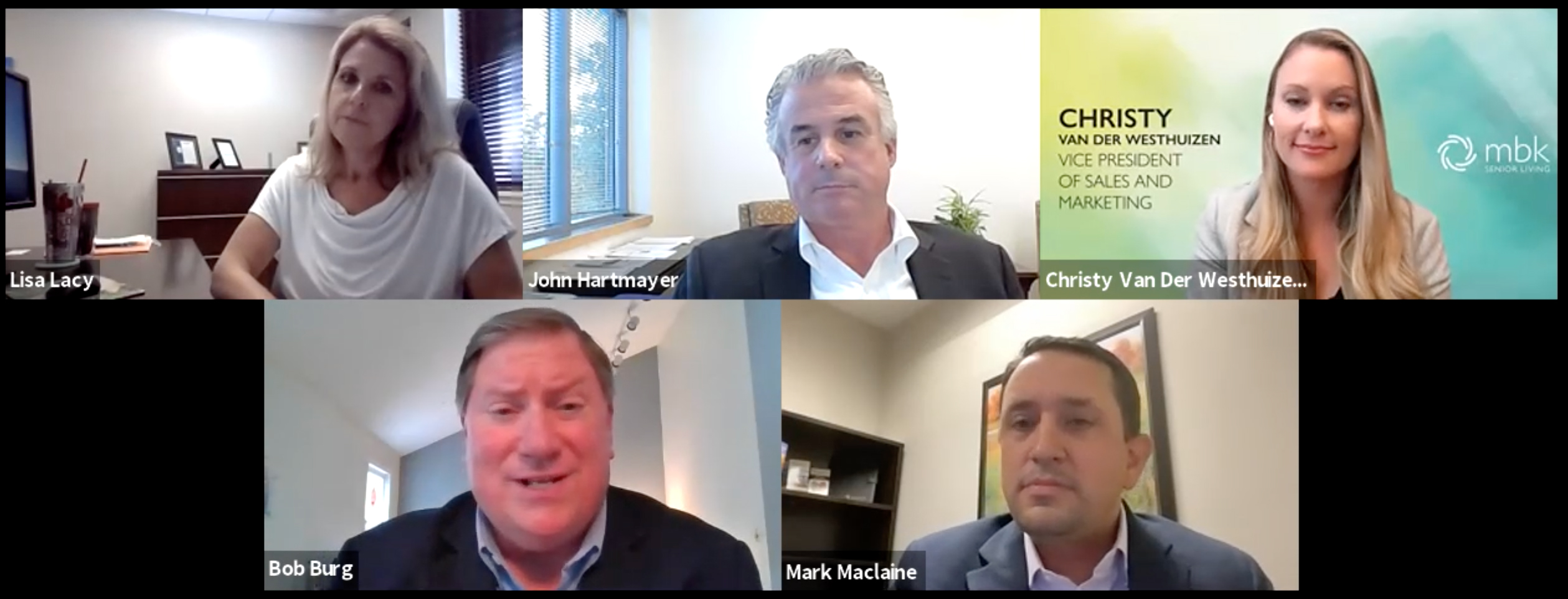Hiring challenges have become a nationwide issue across industries, but seniors housing operators may be among the worst hit. First, the COVID-19 pandemic scared many prospective workers away from the industry. Then many stayed home to take care of children who couldn’t attend school, bolstered by enhanced unemployment benefits.
Now many operators are faced with a difficult decision: Should they mandate COVID-19 vaccines among their staff, adding more difficulty to the staffing situation but better protecting residents from the deadly virus?
This was the topic discussed on a webinar entitled “COVID Strategies For Seniors Housing Operators: Managing Risk for Residents, Staff and Service Providers,” presented by Seniors Housing Business and sponsored by Moves for Seniors. Panelists included Lisa Lacy of Discovery Senior Living; John Hartmayer of Benchmark; Christy Van Der Westhuizen of MBK Senior Living; moderator Robert Burg of Moves For Seniors; and Mark Maclaine of Oakmont Senior Living.
“We have a great group here that spans human resources, operations, sales and marketing,” noted Burg as the discussion began. “We need all of that expertise to talk about the mandating or non-mandating of vaccines for staff, the impact that has on staff and the challenges COVID has provided us in terms of occupancy.”
Two of the operators — MDK and Benchmark — did mandate vaccination for staff, with exceptions for religious or health reasons. The other two — Discovery and Oakmont — have not. All four, though, said the decisions stemmed from discussions with residents, families, staff and corporate-level employees.
Benchmark made the decision in May, with vaccination required by July 1.
“When we announced the mandate we were less than 60 percent on vaccination rate. We’re sitting right now at just shy of 90 percent,” said Hartmayer. “We had a lot of meetings with residents and staff to determine what was the best thing for residents. Ultimately it wound up to be a very easy decision for us to mandate.”
While Oakmont did not require vaccination, the company did implement a very aggressive program of “education and access,” according to Maclaine.
“We have a medical director that we hired that held informational sessions with everyone at the community level and the regional level championing the benefits of the vaccine. Combining that with access, some of the earliest vaccine clinics here in California were at some of our Oakmont communities.”
That has paid a benefit to the company, Maclaine added. The State of Califorrnia, where 49 of Oakmont’s 51 communities are, is requiring all seniors housing caregivers be vaccinated by Nov. 30. However, because the company was already so aggressive, “it’s going to have a negligible effect on our ability to staff and care for residents,” concluded Maclaine.
What do employees want?
Following the vaccination discussion, Burg moved on to wider solutions to the shortage of workers facing the seniors housing industry.
Although she noted that increasing wages might have been an overdue “right-sizing” for the industry, Lacy said that the future will require creative solutions.
“We’ve stepped back the last 6 months and asked our staff: ‘what’s important to you?’”
The responses from employees included more time off, more schedule flexibility, more time to spend with family and help with work stress. As a result, Discovery has implemented a wide variety of new possibilities, Lacy said. Staffers can now chose to work three days a week with 12-hour shifts rather than a standard five-day week. Many workers are now cross-trained across multiple disciplines, “that way when we have openings or shortages, we have more of a pool to pull from.” Some employees now work at multiple locations, presuming they’re physically close to each other, to help keep all the shifts covered.
When children were out of school, Discovery even offered daycare subsidies so employees didn’t have to choose between coming to work and taking care of their children, said Lacy. “How can we help them with those things and focus more on the work-life balance?”
Van Der Westhuizen of MBK added that operators need to start treating their hiring process with the same urgency as the sales process of finding new residents.
“The pandemic and the employee crisis has really shined a light on how important recruitment is and how it really mimics the sales process that we’ve spent years developing,” she said. “That has been a positive thing, shifting our focus to recruiting quality team members through our story, through our hopefully very prompt follow-up and getting to the heart of why they’re looking for a new job.
“I know we need a mass number of employees, but I think we need a mass number of really good employees.”
To view the full webinar, click here.
— Jeff Shaw

